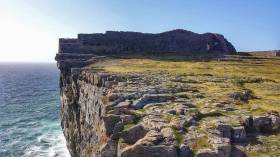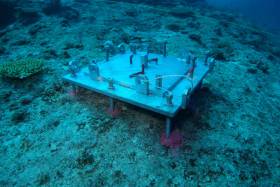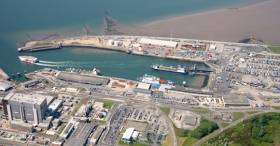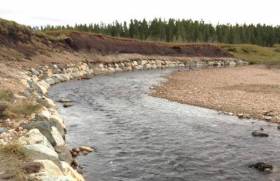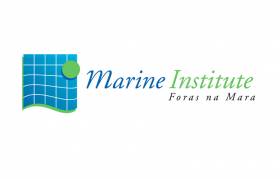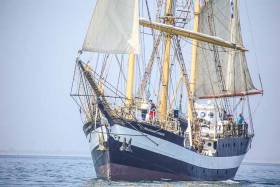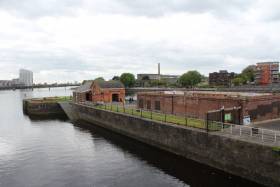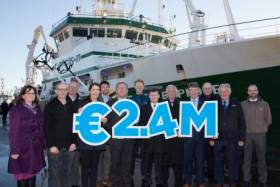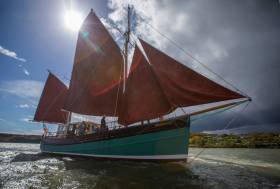Displaying items by tag: Funding
Cemetery Works On Inis Mór Among Coastal Protection Projects Funded By €750K Grant
Galway Bay FM reports that almost €100,000 has been ring-fenced for the completion of coastal protection works on Inis Mór in the Aran Islands.
The works will focus on arresting erosion at the island’s coastal cemetery, which locals fear will bear the brunt of more extreme weather in the future.
The funding comes from a grant of more than €750,000 from the Department of Culture, Heritage and the Gaeltacht to complete improvement works on a number of the Ireland’s coastal islands.
Besides Inis Mór, the list includes Whiddy Island, Bear Island, Hare Island and Sherkin Island in Co Cork; Inis Bigil, Clare Island and Inishturk in Co Mayo; and Oileán an Bhráighe, Árainn Mhór and Gabhla in Co Donegal.
An ‘Irish ocean observing system’ is among six research projects to receive €25 million in funding through the Science Foundation Ireland (SFI) Research Infrastructure Programme.
Innovation Minister Heather Humphreys yesterday (21 October) announced the investment as part of Future Jobs Ireland that will be distributed among the six infrastructure projects “in areas of strategic priority across a variety of disciplines”.
Mr Michael Gillooly of the Marine Institute is lead on the EirOOS Irish Ocean Observing System, a component of the European Ocean Observing System (EOOS) that aims to further scientific and technical research capacity in key areas such as sea level science, ocean circulation and carbon sequestration, allowing us to better understand the connection between Ireland and the Atlantic.
Announcing the awards, Minister Humphreys said: “The quality of research being undertaken in Ireland today is testament to our world-class research community. This talent combined with the support provided through programmes like this one maintains our reputation as a great place to do business and work.
“The successful projects are at the cutting edge of innovation and are helping us to achieve our goal of preparing now for tomorrow's world.”
The SFI Research Infrastructure Programme aims to ensure Irish researchers have the capacity to apply for international funding opportunities, including Horizon 2020 funding calls.
Additionally, the programme eases inter-institutional sharing of national research infrastructure, especially for institutes of technology, as well as effective collaborations with industry.
Welcoming the investment in EirOOS, new Marine Institute chief executive Dr Paul Connolly said: “Sustainably managing our oceans and understanding the impacts of ocean and climate change, requires increased observations on and within the ocean.
“These observations underpin research and advice to support policy makers in sustainably managing our oceans and also in developing adaptation and mitigation plans for climate change impacts.
“The investment in the EirOOS infrastructures will enable enhanced ocean observation and underpin forecasting and modelling in the marine area.”
UK Ports Group Confirms Details of Government Brexit Funding
The Irish Sea ports of Liverpool and Heysham in addition Sheerness (London Medway) all part of the Peel Ports Group, have received funding to enhance measures they have already taken to improve resilience ahead of the UK’s expected departure from the EU on 31 October.
The funding according to Peel Ports Group was announced last month by Transport Secretary Grant Shapps.
These funds will go towards creating more space for HGV parking and container storage to support smooth trade operations by RORO (roll-on, roll-off) ferries, especially across the Irish Sea. (Afloat adds, Peel Ports also operate the MTL Terminal in Dublin Port.)
The fund comes as part of a £30m government scheme, announced last month, to bolster ports across England and ensure they continue to operate efficiently post-Brexit.
Mark Whitworth, Chief Executive Officer of Peel Ports, said: “We are doing everything we can to help our customers continue delivering import and export trade throughout our port network. This government funding helps us to put in place additional measures to achieve that. Whatever happens after 31 October we are as ready as we can be to facilitate global commerce that will benefit the UK economy.”
Transport Secretary Grant Shapps said: “Our world-leading maritime ports are fundamental not only to our success as a global trading nation but also to people’s everyday lives, bringing vital goods into the country. This timely investment will support ports across the country in their work to boost capacity and efficiency, ensuring they’re ready for Brexit and a successful future.”
For information on Peel Ports RoRo services click this link.
Sailing and rowing are among the beneficiaries of Sport Ireland’s €3 million investment in women in sport announced yesterday (Thursday 6 September).
Rowing Ireland will receive €100,000 over two years, while Irish Sailing and Canoeing Ireland will get a total of €80,000 for 2019 and 2020.
Irish Surfing also figures in the list with a €20,000 total allocation for this year and next, while the Irish Waterski and Wakeboard Federation receives €10,000.
Funding under the relaunched Women in Sport Programme complements the €265,000 allocated to Local Sports Partnerships earlier this year, brining Sport Ireland’s total investment for 2019 and 2020 to €3,277,000.
The announcement follows the publication of Sport Ireland’s new Policy on Women in Sport earlier this year, which identifies four key target areas: Coaching & Officiating, Active Participation, Leadership & Governance, and Visibility.
Speaking at the launch at the Sport Ireland campus in Blanchardstown, Sport Minister Brendan Griffin said: “One of the key objectives of the Government’s National Sports Policy is to increase the number of women and girls participating in sport and to eliminate the participation gradient between men and women.
“While the gender gradient, at 4.5%, is narrower now than at any point over the past 10 years, it is important that this gradient is eliminated altogether.
“Sport Ireland’s new Women in Sport Policy and the re-launched Women in Sport Programme is essential in this regard. I want to pay a particular tribute to our high-profile sportswomen who continue to inspire and encourage thousands of girls and young women throughout Ireland every day to become involved in sport and to stay involved.”
Lynne Cantwell, chair of the Sport Ireland Women in Sport Steering Group, added: “The funding process has seen national governing bodies embrace projects focused on developing leadership opportunities, and pathways to coaching and officiating.
“This holistic approach will lead to a step-change in the landscape for women’s involvement in sport across the board from grassroots to leadership.”
Inland Fisheries Ireland Launches 2019 Funding Call For Conservation & Development Projects
Inland Fisheries Ireland has announced a new funding call for 2019 with three funding schemes now open to angling clubs and community groups.
The funding has been made available for fisheries conservation projects and development projects nationwide through the National Strategy for Angling Development (NSAD).
Applications are invited from angling clubs, local development associations, tidy towns and others who may be looking to carry out projects.
The 2019 funding call consists of three schemes.
The NSAD Capital Grants Scheme 2019 (€136,000) is aimed specifically at capital improvement works with grants available to groups and individuals looking to improve angling access and infrastructure in their locality.
The Salmon and Sea Trout Rehabilitation, Conservation and Protection Fund focuses on the protection of both salmon and sea trout. It will fund rehabilitation, protection and conservation projects, all of which must focus on salmon or sea trout. This fund replaces the Salmon Conservation Fund and extends it to include both salmon and sea trout with project values starting from €2,000 for awareness projects. The upper limit of €15,000 has been removed.
The Midlands Fisheries Fund (€50,000) will focus on conservation and rehabilitation projects in the midland fisheries permit area. The fund has been created through contributions from the permit income received via the Midlands Fisheries Group permit area.
Sean Canney, Minister of State with responsibility for the inland fisheries sector, said: “Since the inception of the National Strategy for Angling Development, we have invested €3.4 million in fisheries development, protection and conservation projects across the country.
“Progress is being made in the delivery of projects which support vital fisheries conservation and rehabilitation and which enhance Ireland’s angling offering. The fisheries resource should be enjoyed by all and this funding call today once more will help bring angling to the broader community in a conservation focused manner.”
Suzanne Campion of IFI said it looks forward to working with community groups from application to delivery stage on their projects.
“We are already partnering with over a hundred clubs and associations in the delivery of fisheries projects. The commitment of these groups in making a valuable difference to their locality is inspiring.”
For more information about the 2019 funding call, to download an information booklet and to submit an Expression of Interest, visit www.fisheriesireland.ie/funding.
All applicants must apply through the Expression of Interest, which opens today (Tuesday 16 April), to progress to full application. Full applications may be submitted from Monday 20 May with the closing date for applications on Thursday 20 June.
IFI will be hosting information workshops over the coming weeks for those looking for further information or support with the application process:
- Dublin — Citywest Hotel — Monday 29 April
- Cavan — Cavan Crystal Hotel — Tuesday 30 April
- Donegal — Harvey’s Point — Wednesday 1 May
- Ballina — The Great National Hotel — Thursday 2 May
- Galway — Maldron Hotel, Oranmore — Friday 3 May
- Limerick — Maldron Hotel — Tuesday 7 May
- Tralee — Ballygarry Hotel — Wednesday 8 May
- Cork City — Rochestown Park Hotel — Thursday 9 May
- Kilkenny — Ormonde Hotel — Friday 10 May
Robotics, Internet of Things and data analytics are set to play a key role in Ireland's blue economy, according to the Marine Institute.
The national funding agency for the marine research industry recently awarded financial investments in two marine technology projects led by Xocean and IDS Monitoring.
Louth-based marine technology firm Xocean has been awarded €199,739 in funding over two years to transform marine monitoring and data collection.
The company uses innovative robotics, particularly unmanned vehicles, and IoT technology to monitor and collect data at sea.
Elsewhere, a new smart data buoy project by Clare-based IDS Monitoring will also benefit from a €196,955 funding grant, to develop a new smart buoy for coastal and inshore environmental monitoring.
The new IDS Buoy will make it easier to assemble, deploy and use buoys, as well as reducing purchase costs and maintenance, whilst enhancing the value of the information delivered through the smart buoy.
Recently announced by the Department of Agriculture, Food and Marine, the industry-led awards support Ireland's Integrated Marine Plan, Harnessing Our Ocean Wealth, as well as the national Marine Research and Innovation Strategy 2017-2021.
“Supporting Irish companies in the marine sector, through research grants, helps to accelerate innovation and drive growth in our blue economy,” said Marine Institute chief executive Dr Peter Heffernan.
“The Marine Institute is committed to assisting industry-led development through knowledge transfer, capacity building and research to enable optimal decision making and planning to best leverage our natural marine resources sustainably and efficiently.
“Both advanced technology research projects funded through the Marine Institute have the potential to be globally significant, and present enormous commercial opportunities for these Irish marine enterprises.
“Increased economic growth and job creation from small and medium sized enterprises based in Ireland is a key component of several national strategies and regional development plans.
“These awards will be carried out with the support of the Marine Institute under the Marine Research Programme 2014-2020 funded by the Irish Government, co-financed by the European Regional Development Fund.”
Sail Training Ireland Chief Executive Welcomes New State Funding For Youth Voyages
Sail Training Ireland chief executive Daragh Sheridan has hailed the recently announced Government funding for young people with disabilities and from disadvantaged backgrounds to take part in tall ships training voyages as “a hugely positive development for the charity”.
Sheridan added that the funding “will enable [Sail Training Ireland] to offer the life-changing opportunity of sail training voyages to even more young people across the island of Ireland.
“It will also mean that we can expand our inclusion voyages that ensure people of all abilities can participate.
“I believe that the Government decision was positively influenced by the highly respected individuals and organisations who already support us.”
Sheridan also expressed his thanks to Paul Kehoe, Minister of State at Department of Defence, and Finian McGrath, Minister of State for Disability Issues, for their support.|
New Round Of Funding For Corrected Sports Capital Programme Submissions
Four aquatic sports-related projects will share in the €7 million in grants announced under the Sports Capital Programme (SCP) for schemes previously deemed invalid in 2017 but since corrected.
In Cork, Lee Valley Rowing Club will receive €12,000 for the purchase of rowing boats and oars, while Fingal Rowing Club in north Co Dublin will get €23,000 under is boat and equipment application.
Equipment for junior sailing will get a grant of €18,500 towards its purchase at Dundalk & Carlingford Sailing Club in Co Louth, and Limerick Boat Club’s re-roofing project receives the biggest sum of his cohort of €37,400.
“The Sports Capital Programme remains an essential vehicle for providing suitable sports facilities and equipment to allow as many people participate in sport as possible,” said Sport Minister Shane Ross.
“The grants which we have approved [on Thursday 17 January] will benefit every county and 23 different sports will see improved facilities and equipment. I look forward to announcing grants to many more deserving sports projects later in the year.”
Minister of State Brendan Griffin added: “Since being appointed minister with responsibility for sport, I have had the pleasure of seeing the huge difference that the Sports Capital Programme has made throughout the country.
“I commend the volunteers behind the clubs and groups receiving grants today. They are the lifeblood of sports in Ireland and providing them with the right facilities and equipment is the least we can do to assist them in their roles as coaches, mentors or grounds keepers.”
Under the 2018 SCP, for the first time, applicants who were invalid under the previous round were invited to correct their applications rather than having to make completely fresh applications.
A total of 186 groups took up this opportunity and over 90% of these groups are now getting a grant.
The full list of grants is available on the DTTAS website, as is the list of successful corrected applications for 2018.
Minister Announces €2.4m Investment By Marine Institute In Industry-Led Marine Projects
Marine Minister Michael Creed TD has announced that the Marine Institute is to provide 12 marine businesses (in collaboration with five universities) with investment funding totaling €2.4 million over three years.
Read the full allocation of the grant recipients here
The funding is being provided to drive continued innovation in Ireland;s ocean economy, a key requirement of the Marine Institute-led National Marine Research and Innovation Strategy 2017-2021.
The 12 grants of up to €200,000 each, which are being provided to individual companies and company-led consortia, will support novel R&D and the development of new technologies in key growth areas such as marine engineering, renewable energy and the blue bioeconomy.
Minister Creed said: “Ireland’s blue economy continues to grow and develop in line with the targets of the national integrated marine plan, Harnessing Our Ocean Wealth.
“Indigenous small and medium enterprises are identifying new commercial opportunities across a range of marine sectors which can lead to economic growth and new jobs. These industry-led awards provide the opportunity for companies to build their R&D capacity and to innovate towards new products and processes.
“I look forward to seeing the 12 successful companies develop and grow their businesses with the support of this significant public investment funding.”
Marine Institute chief executive Dr Peter Heffernan added: “The Marine Institute is committed to assisting industry-led development through knowledge transfer, capacity building, research and innovation. This investment in industry-led research is a key deliverable of the Marine Institute Strategic Plan 2018-2022: Building Ocean Knowledge, Delivering Ocean Services.
“Job creation in the marine sector is increasing as a result of such investment and Irish marine companies have built an excellent reputation internationally for innovation and best practice. The 12 companies receiving funding through this funding call have demonstrated the demand and capability to fuel further growth through marine research.”
Increased economic growth and job creation from small and medium-sized enterprises based in Ireland is a key component of several national strategies and regional development plans. These awards will be carried out with the support of the Marine Institute under the Marine Research Programme 2014-2020 funded by the Government, co-financed by the European Regional Development Fund (ERDF).
A diverse range of companies applied to the Marine Institute, following the launch of its industry-led call in May 2018.
Awards have been approved for companies operating in a range of marine sectors including companies such as SolarMarine Energy (€195,465 for a floating solar hybrid energy project), Gavin & Doherty Geosolutions (€199,957 for a morphodynamic study of the Irish Sea), Subsea Micropiles (€199,902 for development of micropile technology in subsea environments), Marine Materials Ltd (€199,816 for its Eureka-SeaWind offshore wind energy project), Exceedence Ltd (€199,532 for its inline gator for aquaculture), w1Da Experience (€198,763 for its marine EcoPowa project) and Resolute Marine (€199,955 for its oscillating wave surge converter design).
Bioresources processing company Bio-marine Ingredients Ltd, was awarded €200,000 for the development of marine functional food to support healthy ageing in older adults, while advanced technologies companies Xocean Ltd (€199,739 for fisheries surveys using ‘swarms’ of unmanned vessels) and IDS Monitoring (€196,275 for its ‘smart buoy’ project), and marine engineering companies Technology from Ideas (€199,960 for the Aquamoor sustainable mooring for shellfish and seaweed) and Ocean Energy (€195,565 for engineering advanced material for marine energy and aquaculture) were also successful in their funding applications.
More Details Of New Funding For Sail Training Opportunities
Minister of State with responsibility for Defence, Paul Kehoe, has announced further details of the new funding approved by Cabinet young people with disabilities and from disadvantaged backgrounds to embark on tall ship training voyages.
Joined by Minister of State with responsibility for Disabilities, Finian McGrath, Minister Kehoe announced the provision of a grant of €85,000 in 2019 and again in 2020 which will go towards youth development in Sail Training Ireland’s charitable programme.
The objective of sail training is youth development rather than just teaching people to sail, which the ministers underline as an important distinction.
In 2018, Sail Training Ireland placed 341 young people on sail training vessels, over 90% of whom were from disadvantaged backgrounds.
Sail Training Ireland does not own or operate is own vessels, but charters as required. This is a different model to the state’s previous sail training vessel, the Asgard, which sank off the coast of France in 2008.
Trainees are selected by nominating organisations such as the HSE, Garda Diversion Projects, Tulsa, Irish Wheelchair Association and the Irish Refugee Council. A total of 37 nominating organisations provided trainees for placement in 2018.
Skills such as communication, leadership, confidence and teamwork are all developed when on board a sail training vessel.
Sail Training Ireland also facilitates young people with a disability to avail of the sail training experience. In 2018 over 25% of those placed on voyages were young people with a disability.
In terms of gender balance, of the 341 trainees in 2018, 185 were young men with 156 young women. Trainees have also come from over 25 counties in Ireland which includes five in Northern Ireland.
The new funding for this year and next has the potential to deliver an additional 50 places for young people from disadvantaged backgrounds in each of those years.
Speaking at an event onboard the Brian Ború vessel at Poolbeg Yacht Club in Dublin today (Friday 11 January), Minister Kehoe commented: “Many of the young people that will selected for these projects have experienced significant difficulties and hardships in their lives.
“In some instances, the opportunities provided by Sail Training Ireland have allowed young people to turn their lives around.
“I would like to commend the work that Sail Training Ireland has undertaken in recent years and wish them well as we face into a new year.”
Minister McGrath added: “Sail Training Ireland once again have shown their commitment to working with people with a disability and I am delighted to be part of today's event.
"Officials from the Department of Defence are engaging with the chief executive and chairman of Sail Training Ireland to ensure child safeguarding procedures are in place and to finalise appropriate governance and financial requirements, in advance of the grant being paid.
"At the end of two year period, a review of the outputs and outcomes of the expenditure will be undertaken by my department."


























